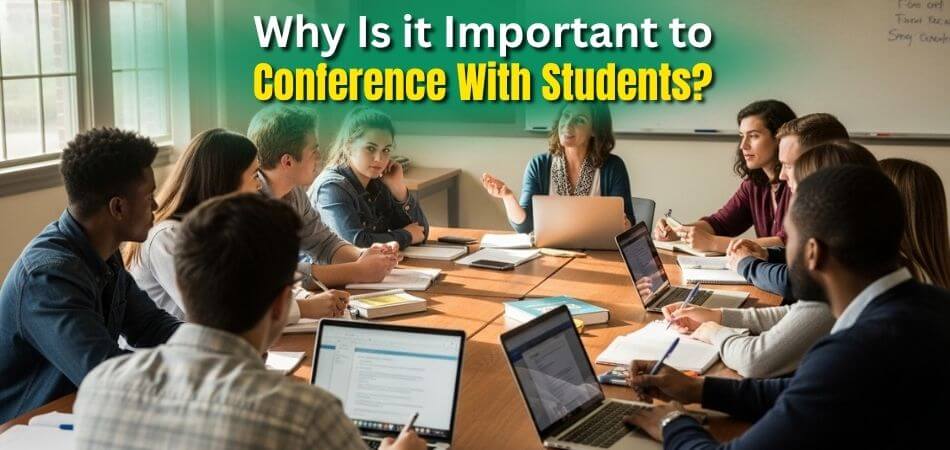There is a lot of meaning in conferences between teachers and students. They create moments where real talks can happen beyond lessons or grades. Many readers may already be thinking about the value of these talks and wonder why is it important to conference with students?
It is important to conference with students because it builds trust, improves communication, and supports personal learning. Student-teacher conferences offer real-time feedback, help set clear goals, and boost motivation and confidence. These one-on-one talks make learning more focused, supportive, and meaningful for both students and teachers.
If you are curious to learn more, this article has everything explained clearly. You will find how conferences improve understanding, solve common challenges, and encourage student progress. Each part of this topic is shared in detail so you can see the real value.
Why Is it Important to Conference With Students?
Conferences are times when real talks happen between teachers and students. These talks are not only about grades but also about growth. They help both sides share ideas and listen with respect. To see the deeper value, read the points shared below.

Better Communication
A student conference is a chance to talk openly with teachers. Students can share thoughts, questions, or goals in a safe way. Teachers also explain progress, strengths, and areas that need more attention. This open talk builds trust and avoids misunderstandings that happen with written notes only. It helps both sides understand each other better.
Personal Learning
Conferences help teachers focus on one student at a time. Each student learns differently, so personal advice is very helpful for progress. This time allows teachers to adjust lessons to fit student needs. It makes learning more effective and meaningful. When students feel lessons match them, they engage more and perform better.
Building Responsibility
Conferences encourage students to think about their own schoolwork carefully. They reflect on what is working well and what still needs change. This makes them more responsible for their own growth. Many educators and experts take part in global events like conferences in Canada, the USA, or many other countries, where they share ideas. In the same way, students benefit when they discuss their progress.
Quick Feedback
Conferences are great because feedback comes right away. Students do not have to wait for test results or reports. Teachers can explain both mistakes and the good parts in the meeting. This quick help allows students to fix issues sooner. It also makes them more confident to keep improving and learning more.
Strong Relationships
These meetings help teachers show that they care about progress. Students feel supported and respected when their teachers listen with patience. This builds stronger connections and trust between them. With trust, learning becomes easier and classrooms feel more positive. Respect and care make a space where both sides can share openly.
Motivation Boost
Conferences often give students extra drive to keep working hard. Teachers highlight strengths that students may not notice on their own. Even when mistakes are discussed, the focus stays on improving. This balance builds encouragement and keeps students motivated. Having personal support from teachers makes learning less stressful and more rewarding.
Clearer Goals
A big benefit is setting goals that are simple and clear. Teachers and students agree on the next steps together. These shared goals help students stay focused on what matters most. They know exactly what actions will lead to better results. Clear plans make learning easier and progress faster.
Confidence Growth
Talking about progress helps students build more confidence in their work. They learn how to explain their thoughts and reflect on progress. Teachers listen and support, which strengthens belief in their abilities. This practice helps them beyond school as well. Confidence gained here can make a big difference in many areas.
Continuous Support
A conference is not only about solving today’s concerns quickly. It also builds a foundation for future talks and help. Students know they can always talk to their teacher for support. This creates a cycle of regular reflection and growth. With ongoing guidance, students feel more connected and prepared for learning.
Conferences play a big role in student learning and teacher support. They create better communication and trust while also building responsibility. Feedback comes quickly, which makes progress smoother and easier. To truly support growth, regular conferences should always be encouraged in learning.
How Can Conferencing Improve Communication Between Teachers and Students?
Good communication makes teaching and learning easier for everyone. Sometimes students feel shy and do not share their thoughts. Teachers may also miss what students are really facing. Regular conferencing is a simple way to solve these gaps. Keep reading to see how it helps build trust and open talks.
Building Trust Through Personal Talks
When teachers hold one-on-one conferences, students feel noticed and valued. A private setting makes it easier for students to open up. Trust grows when they see teachers really care about their progress. Over time, students share more honestly without fear of being judged. This trust makes learning smoother and more meaningful for both sides.
Encouraging Open Dialogue
Conferences give space for both teachers and students to talk freely. Students can ask questions that they may avoid in front of the class. Teachers also get the chance to explain lessons in simple ways. The open dialogue helps clear doubts right away. This regular talk builds a stronger understanding and better connection in learning.
Helping Students Express Concerns
Some students struggle to share problems in large groups. A conference gives them a safe place to speak about challenges. They can discuss schoolwork, pressure, or personal worries. Teachers then provide support or guide them to solutions. This simple step makes students feel heard and supported in school life.
Improving Feedback And Guidance
Conferences are useful for giving direct and personal feedback. Teachers can highlight strengths and suggest ways to improve. Students hear feedback that is specific and easy to act on. This helps them understand exactly where they stand. Better guidance leads to steady progress and higher confidence in learning.
Strengthening Teacher-Student Relationships
Strong relationships are built through regular and honest conversations. Conferences show that teachers care about more than grades. Students feel respected when their views are taken seriously. This respect leads to stronger bonds over time. A healthy teacher-student relationship makes the classroom a positive place to learn.
Conferencing creates a safe space for sharing ideas and worries. It builds trust, clears doubts, and improves relationships between teachers and students. Regular talks also help students express problems and get support. Teachers and students both benefit when communication grows stronger through these simple meetings.
What Role Do Student Conferences Play in Building Confidence?
Conferences give students a chance to share their ideas with teachers. They help create a space where students feel noticed and respected. This support builds trust and makes students believe their voice matters. Keep reading to learn how these talks help boost confidence.
Feeling Heard And Respected
When students share their thoughts in conferences, they feel heard. Teachers listen closely, and this builds a sense of respect. Feeling respected makes students believe their opinions matter. This simple act can lift their confidence. One of the clear benefits of attending conference as a student is the boost in confidence that comes from being heard and having a say in one’s own learning progress.
Building Trust With Teachers
Conferences create a safe space where students talk openly. Teachers listen with care and guide them with helpful advice. This trust makes students more relaxed when sharing concerns. They start to feel that teachers are partners, not judges. Over time, this trust adds to their confidence in learning.
Learning To Take Ownership
In conferences, students reflect on their progress with guidance. They set goals and understand their strengths and needs. When they get to choose steps forward, they take ownership. This builds responsibility and pride in their work. It makes them confident to handle challenges with a positive mindset.
Motivation Through Personalized Attention
Every student has different needs, and conferences highlight them. Personalized attention shows that teachers value their growth. This care makes students feel important and supported. As a result, they become more motivated to try harder. With this push, they believe in themselves and gain more confidence.
Improving Communication Skills
Speaking up in conferences improves the way students talk. They learn to explain their progress in simple words. This practice helps them build clear communication skills. Being able to talk about learning makes them self-assured. The more they share, the more their confidence grows naturally.
Student conferences build confidence in many simple but strong ways. They help students feel valued, respected, and more in control. Personalized talks also give them the courage to set goals. These moments shape students into confident and motivated learners.
What Challenges Might Teachers Face During Student Conferences?
Teachers often meet students in short conferences during class time. These talks can be very helpful, but they also bring many issues. Time is often limited, and students may not open up easily. Large groups also make it harder to give each student full attention. To see these details more clearly, let’s go through some key points below.
Time Limits During Conferences
Many teachers have only a few minutes for each student. Short talks may not allow enough space for deeper feedback. This can leave students with only general advice. Teachers can solve this by planning main points ahead of time. Simple notes help them stay focused and give clear feedback quickly.
Large Class Sizes
Big classes often mean less time for each student. Teachers might rush or miss small details about learning needs. This makes students feel overlooked or unheard. Breaking students into smaller groups can help balance this issue. Teachers can also use written notes to cover things left out in talks.
Shy Or Quiet Students
Some students may feel nervous during conferences and avoid speaking. They may answer with very short words and hide real problems. This makes it hard for teachers to fully help them. A calm space, warm tone, and gentle questions can make shy students feel safe. Patience often brings more open answers over time.
Balancing Different Needs
Not all students need the same type of support. Some want more detailed advice, while others prefer short tips. Teachers may find it hard to match each style in a short time. Asking students how they like to receive feedback can help. This shows respect and makes conferences more personal and useful.
Sharing Feedback Clearly
One challenge teachers face is knowing how to share feedback in a clear and helpful way, which is why following the best practices for presenting conference insights can make these conversations more effective. Simple language, clear examples, and a positive tone often work best. Teachers can also ask students to repeat the advice back to confirm understanding. This ensures both sides leave the talk with clear ideas.
Conferences can be short, rushed, or even a little stressful. Still, they give teachers a chance to build better links with students. With good planning and patience, even shy or quiet voices can be heard. Using the right methods helps teachers give fair time and clear feedback. Careful steps make conferences more useful for both sides.
FAQs About Why Is it Important to Conference With Students?
Conferencing with students is an important part of learning and teaching. Many people have questions about how these talks really help in school life. To make it clear, here are some common questions with simple answers. Each one explains how conferences can make learning stronger and more personal.
How Do Conferences Help Students Feel More Involved In Learning?
When students talk in conferences, they take part in planning their own learning. They get a chance to share ideas and be active in decisions. This makes them feel included and more serious about school. Being involved gives them a sense of control and responsibility.
Can Conferences Help Teachers Understand Student Learning Styles Better?
Every student learns in a different way, and conferences reveal this. Teachers can ask questions to know if a student prefers reading, listening, or doing activities. When teachers understand learning styles, they adjust lessons to fit better. This leads to more effective learning for each student.
Why Do Conferences Make It Easier To Solve Problems Early?
Many small problems can grow if not discussed in time. Conferences give space for students to share struggles before they get too big. Teachers can then give help quickly and provide solutions. Solving problems early makes learning smoother and less stressful.
How Do Conferences Help In Reducing Classroom Stress?
Sometimes students feel stressed when they cannot share their worries in class. A private conference gives them a safe space to open up. Teachers can listen, understand, and give simple advice. This support helps reduce stress and creates a calmer classroom environment.
Do Conferences Improve How Teachers Plan Future Lessons?
Yes, conferences give teachers direct feedback about what works or not. Students share which topics feel clear and which ones feel hard. Teachers then use this input to plan future lessons more effectively. Better planning makes learning easier for everyone in the class.
How Do Conferences Encourage Students To Set Personal Goals?
When students sit with teachers, they often talk about future steps. Teachers guide them to set clear, small, and reachable goals. Students then take charge of their own growth with these goals. This makes them more focused and motivated in their daily studies.
Can Conferences Help Parents When They Join The Discussion?
Yes, when parents join, they also hear about progress directly. Teachers, students, and parents can talk together about needs and plans. This teamwork makes the support stronger for the student. Parents also understand better how to help at home.
Why Are Conferences Helpful For Students Who Lack Confidence?
Some students are unsure of their abilities and stay quiet in class. Conferences give them personal attention where they can speak without fear. Teachers highlight strengths that build self-belief step by step. This personal support helps them grow more confident in their skills.
How Do Conferences Teach Students To Reflect On Their Learning?
Conferences guide students to think back on what they have done. Teachers ask questions about both successes and struggles. Reflecting helps students understand their own progress better. This practice improves learning habits and makes them more thoughtful about schoolwork.
Why Are Conferences Important For Building A Positive Classroom Environment?
When conferences happen often, students feel that teachers really care. This feeling builds respect and trust inside the classroom. A classroom with respect is more positive and cooperative. Conferences, therefore, improve not just individuals but the whole learning environment.
Conclusion
Conferences between teachers and students are more than just short talks about schoolwork. They create a space for personal feedback, quick guidance, and stronger connections. With regular discussions, learning feels smoother, students stay motivated, and teachers can give support that matches individual needs.
So, why is it important to conference with students? It helps improve communication, builds trust, and gives both sides a chance to share openly. Conferences also make students more responsible for their learning, while teachers can adjust lessons to guide growth in the best way.
To make the most of conferences, teachers should prepare key points, listen with patience, and encourage open sharing. Simple steps like asking clear questions or setting shared goals can bring great results. Best wishes for building stronger connections and supporting learning through meaningful conversations.







